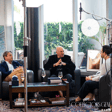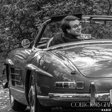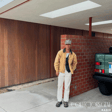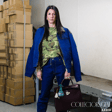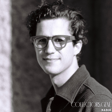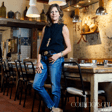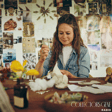Sources of Inspiration
00:00:00
Speaker
I could be inspired by travels, architecture, a piece of clothing, a song, a feeling. So it comes so many different ways for me. And we're talking about collecting today. I collect all those feelings and I keep those in my head and I draw on those experiences as I'm evolving through an idea
Introduction to Collectors Gene Radio
00:00:28
Speaker
on, everybody? And welcome to Collectors Gene Radio. I'm your host, Cameron Steiner, and I'm joined by my co-host and brother, Ryan. This is all about diving into the nuances of collecting and ultimately finding out whether or not our guests have what we like to call the Collectors Gene. That's right. And as always, please subscribe and leave a review for us. It truly helps. We hope you enjoy the pod. Let's go.
Spotlight on Sam Fox
00:01:00
Speaker
Each city has that local business hero, if you will. For Phoenix, that's Sam Fox. Fresh off selling his company, Fox Restaurant Concepts to Cheesecake Factory, Sam has created one of those brands that you just know when you're at one of his concepts. Don't ask how because the food is different at each one, but maybe it's the quality mixed with the service, tied in with the atmosphere. I have no freaking idea.
00:01:26
Speaker
But each spot he opens kills it. He's been around the valley here for quite some time. I actually even had a run-in with him in high school at one of my first jobs and subsequently later on in college when they awarded Sam with the Entrepreneur of the Year award for our business school. He's got his finger on a lot of stuff around here and we were definitely lucky to have him.
00:01:49
Speaker
Yeah, this conversation was a little different because Sam came into the conversation confused about what it was that he really collected.
00:01:59
Speaker
That was kind of the point for us. We wanted to talk about the mix of collecting and business. What made Sam want to start another concept after his first one? How about the several other after that? Sam soon came to realize that his collection of restaurants was also a personal collection of experiences for him.
00:02:20
Speaker
And that was a really cool moment for you and I, Kim. I mean, the goal for everyone here is to realize that collecting doesn't have to be something that you can put in your pocket or on your wall or on your wrist.
Sam Fox's Restaurant Collection
00:02:32
Speaker
You can collect many things in many different ways. And we got Sam on board with that. You can hear it in his voice when he talks about all his concepts and how he built them. It's pretty freaking awesome. So ladies and gentlemen, this is Sam Fox for Collectors Gene Radio.
00:02:50
Speaker
Sam, thanks so much for chatting with us today. This has been long overdue as we're going to be chatting about collecting today, kind of on a different spectrum, if you will. But obviously, this podcast revolves around collecting and singling out categories that our guests collect in. So it's kind of a unique and fun conversation for us to have with you as we're going to be chatting about your collection of restaurants. Great. Look forward to it.
00:03:17
Speaker
And if we do get any backlash on that, you do collect plenty of James Beard nominations, so we can delve into that deeper if needed. I collect the nominations. I don't usually collect much of the trophies though, for some reason. We're going to change that. Here's in Lucci, if you know who that is, of James Beard Awards. Yeah, awesome. Sam, why don't you tell us a little bit about how you got into the food business?
Influence of Family in Restaurant Business
00:03:42
Speaker
Yeah, you know, my family's been in the restaurant business all my life. So I'm really a third generation restaurant kid. And my parents had some restaurants while I was growing up in Chicago and then in Tucson. Nothing like what I have today more mom and pop places where you really worked and it was
00:03:59
Speaker
means for a job and through my childhood I would spend an enormous amount of time in the restaurants as my parents both of them were working within the restaurants in the store so you know it was somewhat ingrained on me early to be in the four walls of a restaurant and seeing people and employees and guests coming through the doors and
00:04:22
Speaker
As I matured a little bit and grew a little, I worked in the kitchen and I worked in the front of the house and I bused and I waited tables. And then my parents did not want me to go into the restaurant business.
00:04:37
Speaker
insisted I go to college. I went to the University of Arizona and studied real estate finance for a minute. And my parents were living with, I was living with them in Tucson and they wound up moving to Florida for some health reasons. And when they moved away, I dropped out of college, raised a little bit of money and opened up my first restaurant against my parents' wishes in 1992 in Tucson, Arizona.
00:05:04
Speaker
and that's basically how I got into the restaurant business. That's good. I'm a little outnumbered here being a Sun Devil with you two Wildcats, but we're going to keep it fun and light here. But being a restaurateur obviously has been in your DNA then for a long time, but how would you say passion plays into it for you?
Passion for Hospitality
00:05:29
Speaker
Passion plays into, for me,
00:05:33
Speaker
I love what I do and I wake up every single day and as my career has evolved, passionate about serving people and providing a great work environment and having people come in and spend money at one of our restaurants, I take it very, very seriously.
00:05:53
Speaker
It's almost like inviting somebody into your house every single day and you don't want to embarrass yourself and you want to overperform and you want to leave satisfied and you want them to come back and spend money with you again. So that passion starts every single day and hopefully the people that work with me feel that passion and that thirst to making sure that we do a great job and then we're a little fanatical about
00:06:18
Speaker
having a great day and then waking up the next day and trying to repeat ourselves and do it again. And while we celebrate our successes, we don't really try to beat our own drum and sort of tout our success. We are only as successful as the last meal that we served. And so that's where that passion comes from within and just the excitement and wanting to take care of people. And like I said, just
00:06:45
Speaker
Understanding people have a lot of choices out there and they choose to come to one of our stores. I take that I take that very personally Love that Awesome.
Inspiration in Restaurant Creation
00:06:54
Speaker
Can you walk us through the major steps that go into starting a restaurant?
00:07:00
Speaker
Well, it can go a lot of different ways, and some people have a good idea. Some people have a good piece of real estate. Some people think they know how to make a pasta dish, so it could start a lot of different ways, and that's no different for me as well.
00:07:18
Speaker
I try not to have a formula of how our stores or how a new restaurant gets from where it is to an opening. It's usually a lot of different things. I could be inspired by another place. I could be inspired by a building. I could be inspired by a type of cuisine, burgers, pizza, Italian food.
00:07:44
Speaker
I could be inspired by travels, architecture, a piece of clothing, a song, a feeling. So it comes so many different ways for me and we're talking about collecting today. I collect all those feelings and I keep those in my head and I draw on those experiences as I'm evolving through
00:08:09
Speaker
an idea, a restaurant, or an existing restaurant, or I see a building I like, and maybe it evokes a thought or a feeling that I've had about something else. And it somewhat speaks to me in wanting to figure out what I want to do in that. I'm really driven by architecture and design. And so that is probably, I would say, the top of a thought that happens in my head.
00:08:36
Speaker
And then driven by food and whether it's an amazing piece of pizza, whether it's a great piece of fish, whether it's a style of eating, healthy eating, whether we did with Flower Child or True Food over the years. And so all of those things are just
00:08:55
Speaker
experiences that I've had and, like I said, collected and there's no rhyme or reason. I could be driving down the street and it could happen. Or I could be on a real estate tour and it could happen. So not one shape or reason for me. Now for other people, most people, they have an idea. Oh, I have this great idea about a restaurant.
00:09:13
Speaker
And they might not think as deeply about a piece of real estate or how it gets used. Or it might be, hey, I really love Mexican food and I want to open a Mexican restaurant. Or I worked at this Italian restaurant for three years and I want to go on and do my own thing and that's what I know. For me, I've been fortunate. I've had so many experiences and been exposed to so many different things that my toolbox, I would say, has a lot of different tools in it.
00:09:40
Speaker
But for new people, I don't think it's somewhat different. It could be, you know, Susie likes to throw dinner parties, so she wants to open a restaurant. By the
Developing Concepts like Flower Child
00:09:50
Speaker
way, I don't recommend that, but that's how some of these ideas happen. So it's different every time.
00:09:59
Speaker
For sure. It's funny because you are creative. I work in television and film and a lot of times I'll see something that inspires me in the same way that you're kind of talking about. And it's so funny how that works with everyone who is truly an artist. And what you do is art. Food is sometimes as complicated as it gets. And speaking on that, what would you say is normally the most difficult step to overcome?
00:10:28
Speaker
The most difficult is to have a vision in your head, have an idea, and being able to translate that to something people can touch, feel, and taste.
00:10:43
Speaker
and getting that right, I think is really something that takes the longest and the most thought into it. So that's probably that process. That's the difficult part. And then trying to, where I think some people go wrong is their vision isn't necessarily aligned with
00:11:10
Speaker
how it actually works or how people actually want to use it or how people relate to it or connect to it. So you have to connect to people. And so I think there's always that disconnect as well. It doesn't always line up.
00:11:27
Speaker
Yeah, definitely makes sense. I mean, would you say that the steps then sometimes when you have a concept, for example, like flower child, flower child comes about as an idea. And are you going from concept to menu first or are you thinking decor first in a situation like that? Or is it usually pretty fluid in terms of the concept menu? Yeah, for flower child that really thought about, okay,
00:11:51
Speaker
there was a need out there for healthy, fast, casual. And we were building true food at the time and I had some true foods and it was an evolution of our thirst for healthy dining and a little bit at a lower price point and a different guess and a frequency. And so in my mind, I always had the menu in my head. So the menu came first.
00:12:20
Speaker
if that's the question.
Real Estate Strategy for Restaurants
00:12:21
Speaker
The menu came first and then the location was actually somewhat towards the end of the process. The menu, the style, how we wanted to execute the food vision, how people were going to use it, how it was going to get used. And then we sought the real estate after developing it that way and understood that how
00:12:45
Speaker
how people would, how we would want people to perceive us and use us. And so that was, like I said, started with the menu first and the real estate was last on that project. Yeah. Quick question in terms of the real estate. I mean, is your goal, do you prefer to try and own your real estate? Do you prefer and try to rent it or is it kind of concept to concept?
00:13:06
Speaker
Yeah, I think every concept is a little bit different. Today, I'm in a financial position that I like to own a lot of my real estate. I would also say early on in my career, I couldn't afford to do that. And if you look at a lot of our real estate, I couldn't afford to buy
00:13:21
Speaker
at main and main Scottsdale and Camelback Road or in Santa Monica on 2nd Street where Flower Child is. Those buildings are so expensive. So when appropriate, when it makes sense from a capital allocation, from understanding the real estate and taking the risk on that as well. Being a landlord, there's risk involved in
00:13:43
Speaker
leasing to a restaurant tenant. So I played the landlord hat and leasing to myself and I've paid the landlord the hat and at least other people. So no, no shape or rhyme or reason on that as well. But I would say that we're
00:13:58
Speaker
small real estate owners of how many restaurants that we have as far as being in our own buildings. I see collecting properties too. Yeah. Yeah. Yeah. You know, I lived on sixth and Broadway for two years, so I definitely have been to flower child more times than I'd like to admit, but in a great way.
00:14:19
Speaker
Good, good, good. Yeah, we wind up doing north on that street. Yeah. And true food originally at Santa Monica Place. And also, that was just somewhere we and you know, I was trying to think am I a collector? I guess I've collected restaurants on that street and you can see
00:14:35
Speaker
you know we're at the billboard and we've done three restaurants and we're at scottsdale order in carolyn and scottsdale and we've had three or four restaurants in that area and the waterfront we've had three restaurants so i guess we like to collect our restaurants together as well
00:14:50
Speaker
Yeah, no, for sure. I mean, yeah, I've been to, I think my first, second day with my girlfriend was at that True Food, right in Santa Monica. Is she still your girlfriend? She's, yep, still together. Good, good. Her friends live in the valley. And so one of the things is always when they come to visit down this way is got to hit flower child or hit True Food or go to North for dinner. It's like, whether it's someone's birthday or something, it's nice to be on this side of town because everyone wants to come to one of your spots.
00:15:20
Speaker
Yeah, I think the reason his girlfriend's still with him is because of that sweet potato hash at True Food. I think that's the sticker. Yeah, that and some sparkling tea and then that I picked up the check. At what point would you say you can start like stamping out concepts once they've been like developed and proven?
Challenges in Expanding Concepts
00:15:41
Speaker
You know, it's that's different as well. I always say the public will decide whether we're successful or not.
00:15:48
Speaker
You can get caught up on a success of one store. You think, wow, I have the greatest concept in the world. And sometimes you do and sometimes you don't. So we're a little cautious because somewhat it's easier for us to have proof of concept in Phoenix for us as everyone knows our brands and who we are. And most of all, the new
00:16:12
Speaker
basically everything that we've done new has been in Arizona. And so we've been able to grow it and curate it and sort of evolve to what we think is something ready to be more than one. And I'll say whenever I do a restaurant, I have a big picture mentality, but we're really super focused on one successful restaurant. Some people like to get ahead of themselves and, hey, we're going to open 20 of these and we're going to open 40 of these and 50 of these.
00:16:39
Speaker
The goal really is to open up one so you can have two. Obviously, being busy helps. Obviously, the financial statement will dictate whether it makes sense to keep investing money into that. Depending on how busy you are, how successful you are from the P&L statement, the profit and loss statement, whether it makes sense. Then do you have something that is
00:17:01
Speaker
Different do you have something why people are gonna choose you over somebody else and sometimes it takes one sometimes it takes two Sometimes it takes five Sometimes you build five and they're successful and store six isn't successful and then you question yourself. It's all different on every different brand that we've grown and so once again, it's happens a little more organically than
00:17:27
Speaker
you know, saying, are we successful? And, you know, we have 20 unit brands that still, hey, you know, there's still, there's still things that need to be worked out in some of those brands. So I think you're always evolving, always trying to make it better, always trying to figure it out. I'm always tinkering. And, uh, you know, there, there, there's search of metrics that I would say people that buy or look at things from a financial aspect, you know, what's your four wall cashflow, what's your,
00:17:56
Speaker
return on cash, what's your top line revenue? What's your percentage of your rent to your sales? So there's a lot of metrics that are financial metrics that dictate a lot of whether you should grow or not. Yeah, that makes sense. And ultimately, I would say probably the goal in your industry, which is
00:18:19
Speaker
one of the most cutthroat industries is to be successful with multiple locations. But what would you say drive someone like yourself to have all these different brands under one house? Because nailing one restaurant really is kind of hard enough.
00:18:35
Speaker
Yeah, I would say, by the way, I wouldn't agree with that statement that you just said. A lot of people are happy. Look at somebody who's been as successful as Chris Bianco, Pizzeria Bianco. For years, he's had one restaurant for a long time. He's evolved and had a couple places over the years and has more than one today, but some people have a really
00:18:57
Speaker
You know, artists approach and they only want to do one, never duplicate it. And that was really a mentality, you know, 10, 15 years ago. I would say a lot of chefs and a lot of business owners today realize how hard this business is. And if they have something successful, it's probably a little bit easier to try and duplicate it than try and do another brand.
00:19:17
Speaker
Well, we've had successes that I've had a little bit of ADD and I like doing so many different things. And early on, it was really driven by the need to have a different restaurant in a building that was really close to one of our existing early on restaurants. And so it was more of, hey, do you want to expand your restaurant?
00:19:38
Speaker
We had a very successful restaurant. It was one of the Norse early on. I said, I don't really want to expand it, but I love the piece of real estate. Why don't we do something new or different in there? That's really how we got into all these different concepts that we've created. Here we are in Phoenix, and we can't open five Norse right next to each other.
00:19:59
Speaker
And so it was driven by the need of wanting to do more stuff and not being able to duplicate the stuff that we had. And then as we started to build some brands and having two or three different brands, then it sort of made sense, well, let's see if we can go do this in another city. And when we go around the country and we look at real estate and we look at
00:20:22
Speaker
where we want to be we don't say hey let's take north to austin texas we say let's go to austin texas and look at a lot of real estate and look at a lot of places and look at neighborhoods and look at communities and what what is missing what needs to be there
00:20:37
Speaker
What will be successful will be north will be blanco will be culinary dropout and having that sort of wide-eyed approach to how we do our real estate and how we grow. I think it's been one of our reasons we're successful it's not like hey let's we need open fifty north and we need open five a year and so we have to go here here here oh.
00:20:58
Speaker
There might be four other Italian concepts, so we're still going to compete with those people. It might not be as successful. Once again, having the big toolbox of having all these different ideas and these different brands has really allowed us to grow in more of a unique way than I would say a lot of other people.
00:21:18
Speaker
It's like tried and true. I mean, you put in, you put in a like, I wouldn't even call it gambles, but the methods were proven of what you were doing was working. So then that was a glowing, you know, for the opportunity for expansion. I admire that.
00:21:32
Speaker
Do you find yourself like visiting your restaurants often? All the time, yeah. You know, here in Phoenix, I office above the Henry. And so I'm here all day and probably at this restaurant six or seven days a week. And that was very important for us as we built our company that we've always had an office really close to the restaurants or we are above at the waterfront, we are above sauce when we had sauce there. And then we did all of an Ivy and culinary dropout.
00:21:59
Speaker
And as we grew that office, it was important when we built this office here that we had a restaurant. And so I'm sitting at my desk right now and I can look out in the parking lots full and I see people coming in and out of the Henry right now.
00:22:14
Speaker
say connected to the guests, I say connected to the employees. But besides that, as I travel the country, I'm always visiting our restaurants, I'm always eating in our restaurants. You know, it is work. You know, sometimes my family will be like, hey, let's go to Blanco tonight for dinner. And I'll say, well, I really don't want to go to Blanco.
00:22:34
Speaker
work and they're like, what do you mean? And I said, well, you know, it's always worked. When I walked through the door, it is somewhat work. And so I always have to remind my family of that. But I love visiting the restaurants. You know, I used to visit restaurants and now I try and visit people, people that are working there, the people that are eating there. And so I think that's
00:22:53
Speaker
more important than visiting the residence and spending time with the teams and the guests. And I've tried to teach my team to have that approach. And so I think we're pretty successful with that, is visiting with our people. Yeah, understandable and definitely a good approach for sure.
00:23:11
Speaker
Would you say that you've gotten pretty lucky with the locations that you've gotten for your offices, for all the restaurants? I mean, they're all in extremely prime real estate and very accessible areas in good areas. You know, there's a lot of good restaurants that are maybe not in great areas, and I feel like they a lot of times don't last for that reason alone. Would you say that you've gotten kind of lucky in that sense?
00:23:38
Speaker
Well, what's old saying, the harder you work, the luckier you get. And so, you know, we've worked really hard with a lot of people, with a lot of relationships, and those are years and years of relationships, being able to find that kind of real estate that we crave.
00:23:56
Speaker
not only being able to get those pieces of real estate, but then being able to perform. And landlords like tenants who perform. Landlords like tenants who say what they're going to do. We're going to build a beautiful, great restaurant. We're going to invest a lot of money, and we're going to be very busy, and we're going to pay you a lot of rent.
00:24:13
Speaker
And so when that works, you seem to get a lot of calls from a lot of landlords. And so the success of the early on of the restaurants propelled us to having great real estate. And then the relationships that we collected
00:24:31
Speaker
over the years with a lot of people and making deals with people, not necessarily even big companies, we still made deals with people that we liked, that we had relationships with, that we spent time with, that we had great debates over and we had great honest, sometimes hard conversations.
00:24:49
Speaker
But then at the end that we always performed and that we had mutual respect for each other and so we looked at it as partnerships that we needed to curate and relationships and by doing all that over the years I feel like we've done a really great job of having the real estate that we've been able to collect.
00:25:09
Speaker
I think something that we have to chat about is a recent milestone for you. And so you folks were recently acquired by Cheesecake
Impact of Acquisition by Cheesecake Factory
00:25:17
Speaker
Factory. Correct. What does that mean for the expansion of the collection of brands and potentially new brands? Yeah, it means a lot of positive things. The acquisition happened in October of 19. And they were investors in some of our brands for several years beforehand. They were investors in North and with Flowerchild.
00:25:38
Speaker
As we developed that relationship over a period of time, we realized how aligned we were and how we do business and how we had cultures within the organizations and talked about a bigger relationship. And that led to the sale of Fox Restaurant Concepts to the Cheesecake Factory. And I would say that it's been very successful. They've been great partners. They are amazing business people, amazing restaurateurs, and more importantly, they're great people.
00:26:09
Speaker
What that's allowed us to do is continue to look for expansion. Obviously we're still in a little bit of a pandemic and there's been a little bit of pause for a minute, but our goal is to continue to grow, grow around the country, take our existing brands that we have, whether it's North or Flower Child or the Henry or Culinary Dropout or Blanco or any one of those existing brands and continue to grow those. And that's what we're in the process of doing.
00:26:36
Speaker
We're well capitalized because of our relationship with the Cheesecake Factory and have a lot of resources that will help us get to markets maybe a little bit sooner. And we'll continue to do that. And as far as new ideas and new concepts that will be born, we've worked through some of those. We've done a digital-only flower child. We came up with a
00:27:00
Speaker
take out only pizza restaurant called fly by that we've been excited about. And I think honestly, those are the best chicken fingers I think I've ever had. Yeah, those amazing chicken wings. So I think you'll see a couple standalone flybys. Those chicken fingers will get woven into the next
00:27:17
Speaker
time we build a doe bird, which will be in Nashville. And so, you know, we learn from all of our restaurants, all of our ideas are all shared within all of our brands. And so we'll continue to grow the brands we have to answer the question and we'll continue to innovate and do some new stuff along the way when and if it makes sense. Love it. Stoked for more. I got to ask, where in town do you like to eat if you're not going to one of your own spots?
00:27:45
Speaker
There's so many places, you know, we spent 25 years here in Phoenix and there's a lot of restaurants. I mentioned Pizzeria Bianco, we have what our car bill does. You know, I was really sad to see Don and Charlie's go. It's a little Chicago steakhouse that I loved for so many years. There was this little Mexican restaurant on 7th Avenue
00:28:08
Speaker
that's closed up now. And so we love little mom and pop places. Obviously we love some of the big steak houses, steak 44. The team over there does a great job as well. But we enjoy going out to eat. We enjoy going to other people's places. We enjoy seeing a lot of other successful restaurateurs. It's good for our community. It's good for that. And so we love a little sandwich shop down in Old Town. It's called Super Chunk. That's great.
00:28:38
Speaker
Yeah, you know, so there's all these cool little spots that we always enjoy. Yeah. On the other end of that, do you think that you could rank your favorite brands of your own?
00:28:49
Speaker
I don't know if I could rank it. I get asked that question a lot. What's your favorite restaurant? I go through stages of ones I like more than others. I go through stages where I use some more than others. Obviously, I'm into Henry all the time, so I would say that I use the Henry a lot. I use Flower Child probably the most on a consistent basis. I can eat there a lot. I can feel healthy about eating there a lot.
00:29:16
Speaker
You know, we're evolving Blanco and we've worked on this chimichanga for a month and probably went to Blanco, you know, six days in a row and ate chimichangas. It could be worse. Yeah, right. And so that could be that. Or working on, I can't tell you how many times we ate those chicken fingers that fly by or worked on the pizza or all of that. So it all just depends. But I guess if I just had to pick one and it could only pick one, it'd probably be flower child.
00:29:45
Speaker
Yeah, love it. So such a great great concept and and it really never fails for sure. Thank you. Thanks. What can we expect from you and the brand in the near future? You know, right now we're
00:30:00
Speaker
coming out of COVID, ramping up our restaurants, hiring people, remembering why people are coming to spend money in our restaurant.
Post-COVID Growth Plans
00:30:09
Speaker
So we're really focused on taking care. We've been so focused on to go and take out. And so today we're really trying to focus on the four wall and executing at a really high level of service.
00:30:20
Speaker
So that's today. And the future looks like we're going to continue to grow some of our brands around the country. We'll start to expand some of our brands and markets that we're already at. We're looking for new markets to grow some of our brands that maybe we're not in today. So I think you'll see growth. I think you'll see development. You'll see evolution of some of the brands that we have. We're always tinkering, trying to make things better.
00:30:47
Speaker
I think you'll see flyby in the next year have one or two standalone locations. And I think you'll see culinary dropout grow. I think you'll see the Henry grow. I think you'll see Blanco grow. Flower child grow. North grow. And then trying to manage all that growth is a tall task. So that's really what we're looking for for the future and just trying to get better at everything that we do every single day.
00:31:11
Speaker
Love it. Awesome. All right, Sam, let's wrap up here with the collector's gene rundown. Sound good? Sure. All right. What's the one that got away?
Learning from Failure with Modern Steak
00:31:20
Speaker
The one idea or concept that you missed or that didn't come to fruition?
00:31:25
Speaker
Yeah, we opened a steakhouse called Modern Steak at Scottsdale Fashion Square. And I think a little bit of the timing, it was 2008, 2009. I think a little bit of the timing was wrong on that. Somewhat the concept was a little bit wrong. The location was definitely wrong. And maybe just the whole idea was wrong. So that was a very expensive mistake at the time. And that is definitely, I'd like to have a do-over on that.
00:31:50
Speaker
Food was darn good though. I know, I love that place. I thought so too. So thank you. What about, so the on deck circle, like what concept are you looking forward to next?
00:32:02
Speaker
You know, like I said, we're going to evolve flyby and then I think you'll see when we build the next doe bird, we're going to take, it says rotisserie chicken, it says pizza and rotisserie chicken. We're just going to take out the word rotisserie and we're going to expand into that chicken finger and chicken wing business plus the rotisserie chicken and do a great chicken sandwich. And then we're going to expand the pizza category. Instead of having just the traditional pizza, we're going to add that Detroit style pizza as well. So the categories will grow within that brand and
00:32:30
Speaker
I think you'll see a big to go component even more so that's already built in that brand and we understand how to build the kitchen a little bit better. We'll be able to execute that through put on that. And so I think we're really excited about what's next for Dobard. What's the unobtainable? What the one market that you'd love to break into that maybe just has too many barriers at the moment?
00:32:51
Speaker
You know, I've always wanted to open a restaurant in New York. In fact, we had a signed lease at one time for True Food and in the middle of trying to figure out, we signed the lease and we had an idea of what it was going to cost and it came back double. And so we wound up actually getting out of the lease, which was not cheap either. And so, I mean, I've always would have loved to open a restaurant in New York. I just don't see it, especially in the environment we're in today. And so maybe one day, but not now.
00:33:17
Speaker
What about the page one rewrite?
Admiration for Successful Restaurants
00:33:20
Speaker
If you could take one restaurant that isn't part of your collection and turn into a sandbox spot, what would it be and why? One that is not mine and turn it into mine. Well, I mean, I would only want to take something that's successful and own it only because it's great, right? And so there's some restaurants.
00:33:41
Speaker
You know, obviously the Hillstone team does an amazing job. One of my favorite restaurants is Nobu Malibu. I think that's my favorite restaurant on the west coast and just from the ambiance and the food and just sitting there on a Saturday afternoon, you know, drinking a great bottle of wine or having some of their great cocktails. And I would love to have that, have my name on that restaurant right there. Me too. I love that place. Yeah.
00:34:08
Speaker
What about the goat? Who do you look up to in the restaurant world? You know, I have so many people that, uh, that I, that I respect tremendously within this business. I would say it's summarized. It is that anyone can make money and open up a business and be successful, whether it's one or a hundred. I have a lot of respect for it in this business. Awesome. Good answer. Yeah, really good. So the chase of the sale, was it like more fun negotiating the deal to sell FRC or seeing it come to fruition?
00:34:39
Speaker
I mean, it was always fun getting the check, I will say that.
00:34:44
Speaker
You know, it was, you know, I'm fascinated by business and, you know, I'm intrigued and I try and learn on everything that I do. So it was an amazing learning experience going through the process, dealing with a team over there at Cheesecake who were wonderful. You know, we have attorneys and bankers. And so that process got my creative juices flowing in a business way. And so that was fun and exciting to be able to
00:35:12
Speaker
Come up with the idea of where we're at and then get it to the finish line and like i said the reward for all that fun work is getting a great big check i was really excited and so the whole process was amazing.
Creating Memories through Restaurants
00:35:27
Speaker
Yeah that probably took some finessing for sure. Yeah but having the relationship.
00:35:34
Speaker
having them being our partners in a couple of our brands for the extended period of time that they were really made things. We all had the same goal in mind, so that was awesome. Love it. Alright, let's finish up with the most important one. Do you feel that you were born with the collectors gene?
00:35:52
Speaker
You know, when I saw that question, I was like, what do I collect? And the reality is, as I had this conversation with you, you know, I guess maybe I am. And really for me, my collection is really memories and creating memories for people within our restaurants. And so I guess I do.
00:36:12
Speaker
Yeah, as we even talk, it's so funny. Like, I was kind of thinking in a similar way. When you're naming all your spots, I was coming back to all these different times and experiences I've had at them. And I think that just goes to further say how great of a job you've done with what you've grown. And hats off to you for that, man. I appreciate it. Thanks, guys. Sam, congrats on all your success and everything. And we love everything that you're doing over at FRC. And we'll continue to enjoy the ride with you. Appreciate it. Thanks, guys. Take care.
00:36:45
Speaker
Alright, that does it for this episode. Thanks for listening everybody. This has been Collectors Gene Radio, signing off.

